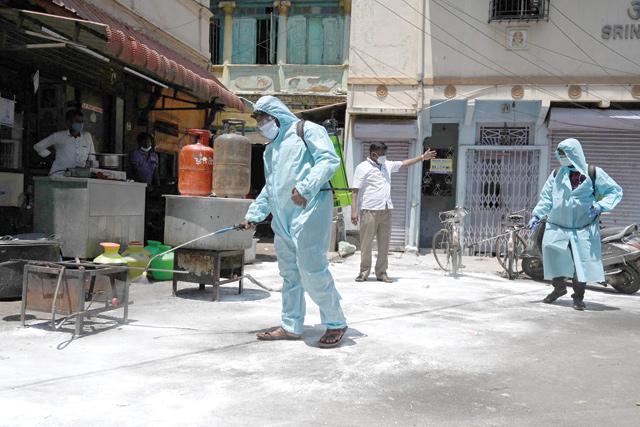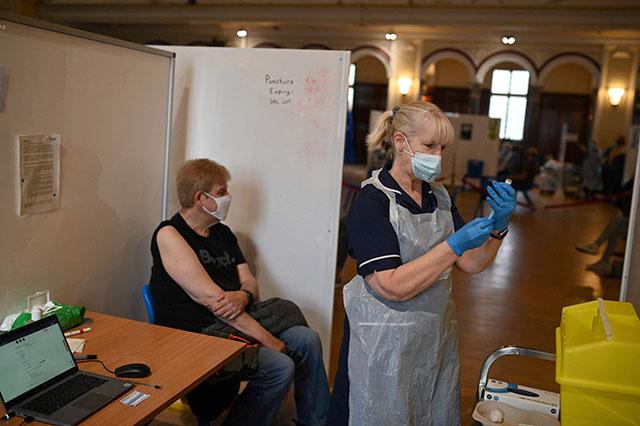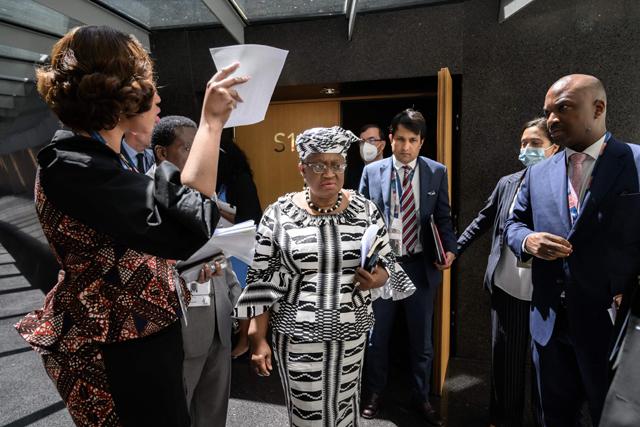You are here
Emerging countries press for COVID vaccine supply in poor nations
By AFP - Jun 02,2021 - Last updated at Jun 02,2021

A health worker sanitises a residential area with a disinfectant as a preventive measure against the COVID-19 at a camp in Chennai on Tuesday (AFP photo)
NEW DELHI — Five of the world's biggest emerging economies on Tuesday called for the development and delivery of COVID-19 vaccines to be sped up, reiterating that measures such as waiving intellectual property rights over jabs could help poorer nations battle the pandemic.
The joint statement by the so-called "BRICS" group — Brazil, Russia, India, China and South Africa — followed an online summit chaired by India's Foreign Minister Subrahmanyam Jaishankar.
The foreign ministers said "extensive immunisation" would help bring the pandemic to an end, highlighting the "urgency for expeditious development and deployment of COVID-19 vaccines, especially in developing countries".
They also expressed support for the global campaign led by South Africa and India at the World Trade Organisation(WTO) to temporarily waive IP rights for COVID-19 vaccines.
Sharing vaccine doses, technology transfers, developing local production and supply chains as well as price transparency would also boost the fight against the infectious disease, the statement added.
South Africa's Foreign Minister Naledi Pandor earlier Tuesday reiterated Pretoria's position that "none of us are safe until all of us are safe".
Securing a waiver agreement "will allow use of intellectual property, the sharing of technologies and technology transfer", Pandor told the BRICS meeting, enabling "the production of vaccine therapeutics and wider distribution".
Supporters of the move argue it will spur production of low-cost generic vaccines, helping poor countries that are struggling to immunise their people.
The US under President Joe Biden has thrown its weight behind the bid alongside China, but other pharmaceutical heavyweights including the EU, Britain and Japan are reluctant.
Opponents argue waiving patents will damage intellectual property rights and erode the profit incentive, ultimately affecting pharmaceutical research and development.
Pharmaceutical companies also point out that manufacturing a vaccine requires know-how and technical resources which cannot be acquired at the flip of a switch.
Pandor, speaking by video link from Pretoria, said “millions of people in wealthier nations have been vaccinated, while billions of people in poorer countries still wait and are still vulnerable to infection, disease and death”.
Just 2 per cent of global vaccines have been administered in Sub-Saharan Africa, according to World Health Organisation figures — a situation that Pandor described as a “global gap of vaccine access”.
Sixty-three countries have backed the Indian-South African proposal, but unanimity among all 164 WTO member states is needed for agreement.
Related Articles
BRUSSELS — The EU voiced scepticism on Friday over the United States' sudden push to waive Covid vaccine patents to boost supply to poorer
GENEVA — The World Trade Organisation(WTO) agreed on Friday to temporarily lift patents on COVID-19 vaccines after two years of bruising neg
GENEVA — The World Trade Organisation (WTO) chief voiced cautious optimism on Sunday as global trade ministers gather to tackle food securit













